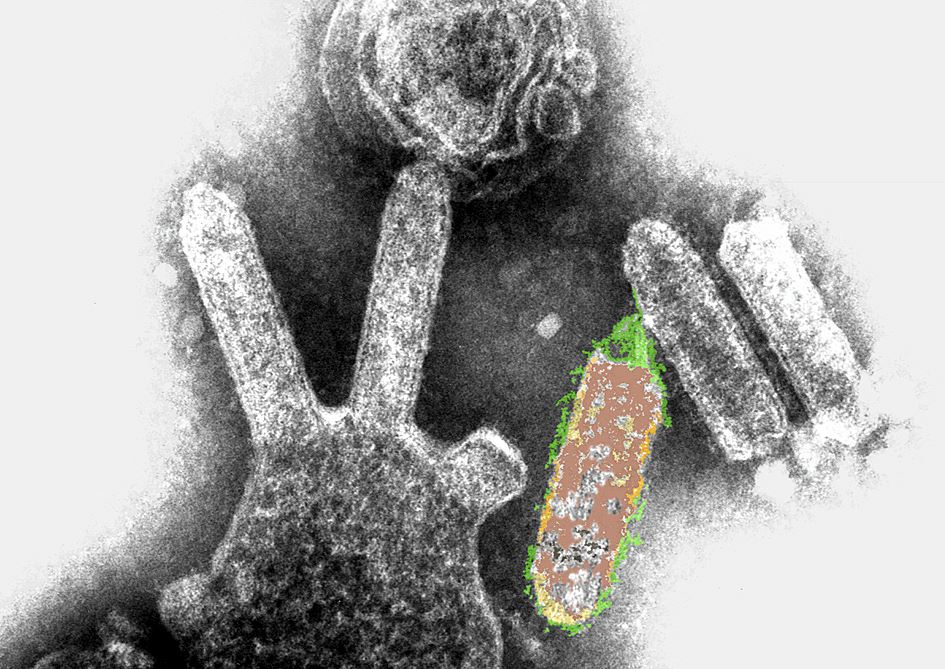Lyssavirus Vaccines
Vaccines play an important role in the prevention and control of lyssavirus. Creative Biolabs has a professional team and an advanced vaccine technology platform to develop efficient vaccines to meet the needs of customers.
Lyssavirus
 Fig. 1 Bat lyssavirus. Distributed under CC BY 3.0, from Wikimedia, without modification.
Fig. 1 Bat lyssavirus. Distributed under CC BY 3.0, from Wikimedia, without modification.
Rabies is a fatal encephalomyelitis caused by lyssaviruses with a mortality rate of almost 100%. The Lyssavirus genus within the family Rhabdoviridae is composed of 14 species of lyssavirus, among which, rabies virus is considered to be the most important lyssavirus species due to its high mortality in humans, livestock and wildlife. Lyssaviruses are perpetuated by low-level transmission within susceptible mammalian reservoir species populations, mainly meso-carnivores and bats. Pre-exposure vaccination can prevent the disease, but booster vaccination upon exposure is required to ensure that the immune system responds optimally.
Conventional Vaccines for Lyssavirus
The first rabies vaccine was developed by Louis Pasteur in 1885 using rabbit spinal cord infected with rabies. Based on the same principles, David Semple developed a relatively safer neural tissue vaccine consisting of phenol-inactivated sheep or goat brain tissue. HDCV was introduced in 1978 using the fixed rabies virus Pitman-Moore L503 strain, which is suitable for growth in normal human fibroblast cell lines. This vaccine has proven to be effective and safer than previous vaccines. It confers complete protection against the silver bat virus strain in humans and is as effective as other available PCECV obtained by culturing a fixed Flury LEP-50 strain in chicken fibroblasts. Currently, effective and safe vaccines for humans are HDCV, PCECV and purified Vero cell rabies vaccine (PVRV), which use an inactivated rabies virus Wistar strain grown on Vero cell culture.
Recombinant Live Vaccines
Live attenuated virus vaccines, such as those based on recombinant viruses expressing rabies virus antigens or replication-defective rabies viruses, show promise in enhancing the potential for immunogenicity and possibly eliminating the need for boosters. Among the various vaccine strains, parainfluenza type 5 (PIV5) is particularly important because it infects a broad spectrum of cell lines without significant cytopathic effects. This allows cost-effective, growth of virus to high titers in continuous cell lines. The PIV5-expressing G protein (rPIV5-RV-G) produces a very strong protective effect (90-100%) and thus serves as a good candidate for a new generation of oral recombinant rabies vaccine.
Plant-based Vaccines
Plant expression systems are capable of producing large amounts of antigen at low cost and, in addition, avoid expensive antigen purification and antigen encapsulation techniques. Therefore, they provide a powerful platform for large-scale immunization, especially in poor countries. The rabies virus G protein is expressed in tomato plants, tobacco and spinach, all of which can elicit a significant immune response, and plant-based vaccines appear to be the most promising candidates.
Epitope-based vaccines
B cell and T cell epitopes from rabies virus nucleoprotein are expressed in Bacillus Calmette-Guerin and Mycobacterium leprae, respectively, all of which elicit high antibody titers. The antibody recognizes the entire rabies virus. Therefore, these components may be an efficient alternative to traditional whole vaccines.
DNA vaccine
DNA vaccines offer a range of advantages for large-scale vaccination. They are inexpensive; easy to develop, produce and purify; stable at room temperature and can cause strong cellular and humoral immune responses. DNA vaccination protects mice, dogs and non-human primates from lethal rabies virus. Therefore, the new DNA vaccine provides a potential platform for the prevention and control of rabies.
Our Services for Lyssavirus Vaccine
- Development of the immunogen
- Construction of the vector
- Expression of recombinant proteins
- Evaluation of vaccine titers
With a wide range of platforms for the development and production of various types of vaccines, Creative Biolabs offers a full range of services from gene synthesis to vaccine development for customers worldwide.
All of our products can only be used for research purposes. These vaccine ingredients CANNOT be used directly on humans or animals.


